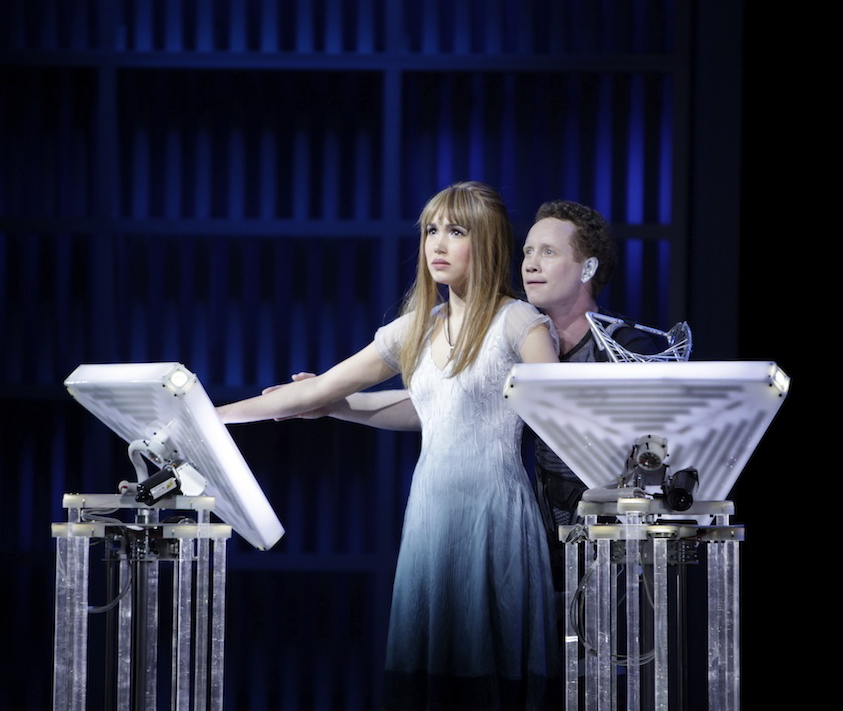COT’s “Death and the Powers” proves a dazzling, thought-provoking multimedia experience

When the eleven robots glide gracefully out on the stage of the Harris Theater to take their curtain call with the cast, composer and conductor of Death and the Powers—and bow their triangular heads in unison—-it’s hard to maintain any lingering objection to Tod Machover’s envelope-pushing, thought-provoking and brilliantly executed opera, a work that raises serious contemporary themes while mostly refusing to take itself too seriously.
Expectations were high Saturday night for Chicago Opera Theater’s Midwest premiere of Death and the Powers, and, with some reservations, were largely met and, in many ways surpassed. Rarely will one see so many genres effortlessly traversed as with Tod Machover’s multimedia piece, equal parts opera, theatrical event and electronic art installation.
First performed last September in Monte Carlo, Machover’s opera had its U.S. premiere in Boston just last month. The tale tells of the wealthy scientist Simon Power who is dying but is eager to continue his legacy by entering “The System,” a post-mortal state in which technology will allow him to continue to exist in disembodied form, controlling his environment, interacting with loved ones and still exerting control over his business and the world.
Simon’s entry into The System proves understandably troubling to his family, especially his loving, humanist daughter, Miranda. Simon’s wife Evvy takes refuge in headphones partly as solace and partly to channel communication with him.
A delegation of world leaders seek Simon’s counsel to problems but he is silent and dismissive. Ultimately, Evvy and Simon’s one-armed assistant Nicholas also enter The System leaving Miranda alone. Simon appears once again in human form to persuade his daughter to join them. She hesitates and instead asks her father if it’s not better to continue to live and even die, imperfect and mortal.
There’s a lot to chew on in this strange futuristic tale (story by former poet laureate Robert Pinsky and Randy Weiner) and the opera raises some trenchant questions about the increasing omnipotence of technology. What is “The System”? Is it the Internet? Google? Facebook? Rupert Murdoch? All of the above, perhaps, as reflected in the countless convenient electronic conveyances that take up a large part of our lives and have the subtle yet insidious effect of preventing us from interacting with each other as human beings.
The restless rushing wordplay of Pinsky’s libretto is often clever with a wry, cynical edge. (Even in his deceased System-atized form, the capitalist Simon boasts “I still have lots of money and I can still sign checks.”).
Death and the Powers works well up until the last third of its unbroken 90 minutes. Much like the bots, Pinsky’s verbose libretto assumes too much dominance and tries to cover too many bases too quickly (even the amount of sugar in our diets). The result is that the opera turns preachy and muddled just at the point where it should be achieving some clarity and thematic precision. The work is not long but could use some pruning and revising to sharpen its focus and avoid losing the thread–and the audience–in the final half-hour.
Machover’s electronic score is consistently inspired, with cascading piano and crystalline high percussion well suited to the mechanistic sci-fi themes. Despite the keyboards and amplification — for the singers as well as the 15-piece ensemble—the music is tonal and approachable with a surprisingly traditional lyricism, as with Evvy’s wordless vocalise and Miranda’s dramatic final scene.
With the generous amplification, all comments on the singers come with a significant asterisk. Aided by the electronic simonizing, James Maddalena’s baritone sounded richer and more technically secure than in recent years, and he brought a firm and vivid characterization to Simon, even with spending most of the opera unseen offstage. As Evvy, Emily Albrink showed a strong soprano with a sensitive rendering of her aria, Touch Me. Hal Cazalet’s vibrant tenor enlightened the weird character of Nicholas, a “post-organic” liaison of sorts between the humans and bots. David Kravitz, Tom McNichols and Douglas Dodson were amusing as the vocally contrasted trio of world emissaries (“The United Nations, The Administration and The United Way”).
But the most impressive performance came from Sara Heaton as Miranda. The petite soprano brought an affecting human quality to Simon’s daughter even when beset by all the surrounding electronic bells and whistles, and she displayed daunting power and agility in the stratospheric notes of her final scene.
Even with the fine cast, the eye-popping production is undeniably the real show here. The banks of lights and video projections and the robots almost become fully realized characters in themselves.
With the frizzy-haired composer working the boards, and fluent, assured direction by Diane Paulus, all the myriad technical hurdles came off without a hitch opening night, a testament to general director Brian Dickie’s emphasis on long and intense rehearsal time.
Gil Rose led the Boston Modern Orchestra Project players with fine momentum and balancing of Machover’s undulating textures. In a heavily multimedia ensemble work, great credit for the success of the production must be shared by sound designer Chris Full, Benjamin Bloomberg (sound technology), production designer Alex McDowell, lighting designer Don Holder, media designer Matt Checkowski and visual and software designer Peter Torpey.
All credit to COT’s outgoing guiding light Brian Dickie whose determination to present envelope-pushing contemporary works in an economically trying era should serve as a striking example to our other less imaginative local music institutions.
Death and the Powers will be repeated April 6, 8 and 10. chicagooperatheater.org; 312-334-7777.
Posted in Performances




